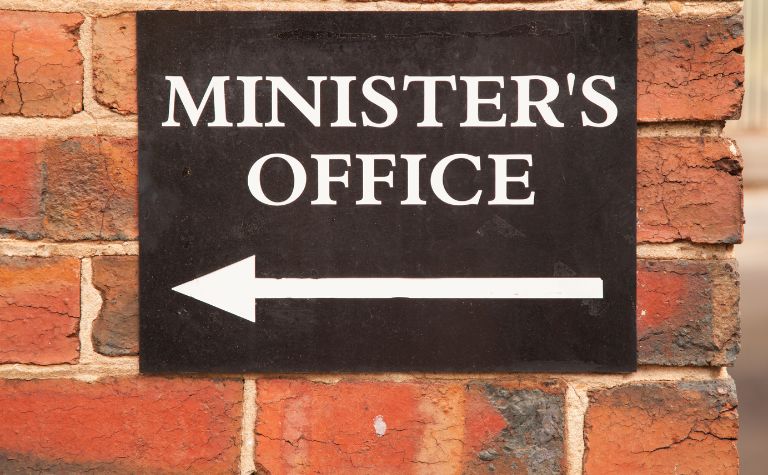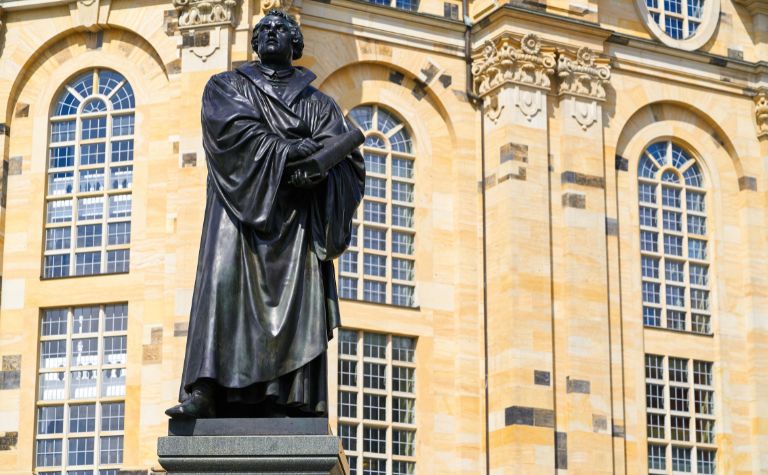Men who shepherd congregations are essential in Lutheran and Roman Catholic churches. Both traditions hold that ministers and priests are worthy of honor and respect, reflected in names and titles given to them, such as “reverend.” One of the names that Catholics call their priests is “father.” Do Lutherans do the same?
Lutherans don’t call their ministers “father” like Catholics do their priests. Lutheran teaching doesn’t universally prohibit calling any earthly man “father” but forbids it in contexts where they believe it obscures God’s glory. Martin Luther taught men could be called fathers in the proper context.
How do Lutherans and Catholics interpret Jesus Christ’s instruction to not call any earthly man father in Matthew 23:9? Why do Catholics call their priests father? What did Luther teach about calling men father? Keep reading to learn more.

Why Lutherans Don’t Call Clergy “Father”
Following the Apostle Paul’s example (see below), the early church called clergy “father.”
At the time, the name didn’t imply all of the doctrines now embedded in the priest’s office. Nevertheless, the term “father” was connected to various offices in the early church. (Also see What Do Lutherans Believe About Mary?)
- Bishop as a father: Men who served as bishop were called fathers for the first few centuries after Christ.
- Pope as a father: When the office of Pope (meaning “papa”) was firmly established in later centuries, the name (Greek, “pappas“; Latin “papa“) was reserved for the man holding that office.
- Abbot as a father: In the 6th century, the word “abbot” was increasingly used, which comes from the name “Abba,” meaning father.
Over time, “father” evolved from an informal term of endearment to a title bestowed on those who earned the proper ministerial credentials, regardless of their relationship to a particular church. (Also see Do Lutheran Clergy Wear Collars?)
Accusations: The 16th-century Reformation in Europe protested alleged abuses in the Catholic church. Men like Martin Luther of Germany, Ulrich Zwingli of Switzerland, and John Calvin of France challenged the Catholic clergy’s doctrinal and ministerial shortcomings.
Controversy: For many protestors (i.e., protestants), Catholic leaders, sometimes with the motivation of acquiring ecclesiastical and political power, were effectively replacing God with clergy in people’s lives.
Dissenters charged that the Catholic church empowered priests to be mediators between God in people in unbiblical ways. They contended that priests weren’t to be God to people; they were to shepherd people to Him.
Lutherans Don’t View Ministers Like Catholics View Priests
It is essential in the Lutheran tradition that church members view the role of clergy based on the teachings of Scripture.
While both testaments contain wisdom on the subject, the New Testament describes the qualifications and responsibilities of leadership for the post-resurrection, post-Pentecost church. (Also see the full article Do Lutheran Churches Have Priests?)
Did the priesthood evolve?
Historically, Lutheranism has argued that doctrines related to the Catholic priesthood developed long after the completion of the Bible.
These doctrines gave priests too much power and obscured God’s role in the life of believers. This fact doesn’t imply that every Catholic priest considers himself a God-substitute.
One priest reflects the view of many when he writes, “The title for me is very humbling. As a priest, “Father” reminds me that I am entrusted with a grave responsibility by our Lord—His faithful people. Just as a father must nourish, instruct, challenge, correct, forgive, listen, and sustain, the priest must meet the spiritual needs of those entrusted to his care, providing them with the nourishment of our Lord through the sacraments.”
He continues, “He must preach the Gospel with fervor and conviction in accord with the mind of the Church, challenging all to continue on that path of conversion which leads to holiness. He must correct those who have erred but with mercy and compassion.” [1]
Nevertheless, Lutheranism charges the Catholic doctrine of the priesthood with unbiblical elements, obscuring God in His children’s lives. The concern in Lutheranism isn’t so much the name “father” but what it implies in Catholic theology. (Also see Lutheran Bible vs. Catholic Bible: What’s the Difference?)

What Does the Bible Mean When It Says Not To Call Men Father?
The Lutheran understanding of the biblical name “father” begins with God’s identity as a father in the lives of His sons and daughters. The following verses are foundational to their understanding,
- Jesus called God “father”: “And he said, ‘Abba, Father, all things are possible for you. Remove this cup from me. Yet not what I will, but what you will.'” Mark 14:36 (ESV)
- Christians are invited to call God “father”: “For you did not receive the spirit of slavery to fall back into fear, but you have received the Spirit of adoption as sons, by whom we cry, ‘Abba! Father!'” Romans 8:15 (ESV)
Abba Father: In Lutheran thinking, calling a “priest” father obscures God’s desire to be Abba Father to His sons and daughters. Another man, like a biological father or a father figure like a mentor, doesn’t have the role of a spiritual shepherd, so there is less confusion and obscurity when that name refers to them. (Also see Why Do Lutherans Make the Sign of the Cross?)
Matthew 23:9: Based on the explanations given above, a reader may think that Catholics and Lutherans have wildly different opinions about this verse, but their interpretations aren’t entirely dissimilar.
| KJV | “And call no man your father upon the earth: for one is your Father, which is in heaven.” |
| NASB | “And do not call anyone on earth your father; for only One is your Father, He who is in heaven.” |
| ESV | “And call no man your father on earth, for you have one Father, who is in heaven.” |
Catholicism and Lutheranism understand that Jesus speaks to the scribes and Pharisees in this passage, who called their leaders specific names, reflecting wayward theological beliefs.
But, traditionally, neither Catholics nor Protestants believe this verse universally prohibits people from calling any earthly man father.
In his commentary on this verse, Calvin wrote: “The true meaning therefore is, that the honor of a father is falsely ascribed to men, when it obscures the glory of God. Now this is done, whenever a mortal man, viewed apart from God, is accounted a father, since all the degrees of relationship depend on God alone through Christ, and are held together in such a manner that, strictly speaking, God alone is the Father of all.” [1]
People called Paul father: Additionally, Paul also believed that, in the proper context, it’s permissible, even beneficial, for two biologically unrelated men to think of their relationship with a father-son dynamic. Paul describes himself as a non-biological father figure multiple times:
- 1 Corinthians 4:15, “For though you have countless guides in Christ, you do not have many fathers. For I became your father in Christ Jesus through the gospel.” (ESV)
- Philippians 2:22, “But you know Timothy’s proven worth, how as a son with a father he has served with me in the gospel.” (ESV)

What did Martin Luther Teach About Calling Men “Father”?
Luther wrote about calling men “father” in his larger catechism. His comments are thorough, perhaps because, like today, people were confused about Matthew 23:9 and why priests are called “fathers” in Catholicism.
First, Luther makes a distinction about what kind of father Jesus is talking about: “So we have two kinds of fathers presented in this commandment: fathers in blood and fathers in office. Or, those who have the care of the family and those who have the care of the country.
Besides these, there are still spiritual fathers. They are not like those in the papacy, who have had themselves called fathers but have performed no function of the fatherly office.”
Second, Luther says it’s appropriate in some contexts to call earthly men “father” even when there is no biological relationship, only a spiritual one. In fact, Luther says sometimes people don’t treat them with due honor:
“For the only ones called spiritual fathers are those who govern and guide us by God’s Word. In this sense, St. Paul boasts of his fatherhood [1 Cor. 4:15]. Since they are fathers, they are entitled to their honor, even above all others. But to spiritual fathers, the least amount of honor is bestowed.
The way the world knows for honoring them is to drive them out of the country and to begrudge them a piece of bread. In short, spiritual fathers must be [1 Cor. 4:13] like the filth of the world, and everybody’s refuse and foot rag.”
Third, Luther implores Christians to support ministers because of their important role: “For those who want to be Christians are obliged in God’s sight to think them worthy of double honor who minister to their souls [1 Timothy 5:17–18]. They are obligated to deal well with them and provide for them…
All are afraid that they will perish from bodily needs and cannot now support one respectable preacher, where formerly they filled ten potbellies. Because of this, we also deserve for God to deprive us of His Word and blessing and to allow preachers of lies to arise again and lead us to the devil. In addition, they will drain our sweat and blood.”
References:
[1] Source
[2] Source
[3] Source
Related Questions
Roman Catholicism and Lutheranism, part of the Protestant tradition, are two of the most prominent branches of the Christian religion. Many people find it interesting to compare and contrast...
The Lutheran and Episcopalian traditions have profoundly impacted Protestant Christianity in Europe, the United States, and worldwide. Yet, these two branches of the Christian faith have similarities...
